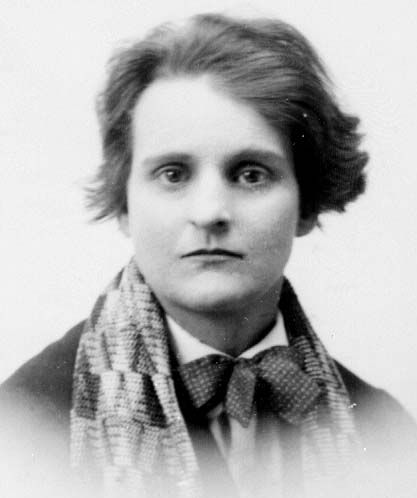Sylvia Beach (Sylvia Beach)

Literary Folk Figure. A noted book-seller, she is remembered as the hub of the ‘Lost Generation’ of Parisian expatriates during the 1920s and 1930s. Born Nancy Woodbridge Beach to a long line of Presbyterian ministers, she chose the name “Sylvia” for reasons of her own, was raised in Baltimore and in New Jersey, moved to Paris in 1901 when her father was named associate pastor of the American Church in Paris, and in 1906 returned to America when Dr. Beach assumed the pulpit of the First Presbyterian Church of Princeton, New Jersey. Sylvia was to spend two years in Spain and during World War I was a volunteer farm laborer in France and a Red Cross worker in Serbia. In Paris after the war she met successful book merchant Adrienne Monnier, whose friend and lover she became, and after deciding that the city could support a top drawer English language bookstore opened Shakespeare and Company on the Left Bank in 1919. From the start, Sylvia wanted to both run a pleasant establishment and to make money; calling her customers “bunnies”, she was the friend, lending librarian, bank, post office, cheerleader, mother-confessor, and hostess to Ezra Pound, Gertrude Stein, Ernest Hemingway, Ford Maddox Ford, James Thurber, Stephen Vincent Benet, Sherwood Anderson, James Joyce, F. Scott Fitzgerald, T.S. Eliot, Thornton Wilder, and others, providing needed introductions and ‘neutral ground’ for the literati to meet each other. A vocal opponent of censorship, she published Joyce’s “Ulysses” herself in 1922 after parts of it were deemed obscene in America, though she suffered financially when the author double-dealt her by signing with another publisher. When a young Ernest Hemingway was given reading lists by Pound and Stein, Sylvia supplied the books and when he needed encouragement she was ready with it, spared Hadley’s jealousy by her status as a lesbian, though there are examples, such as Jinny Pfeiffer, of such orientation providing no protection against Papa’s advances. She frequently held readings in her shop and dinners in in her home at which there was always good conversation and plenty of the strong drink not then available in America. Also a respected translator, she won awards for rendering the works of Paul Valery and Henri Michaux into English. Shakespeare and Company survived the Depression, barely, but not the German Occupation; forced to close in 1941, she was held in a prison camp at Vittel for six months, stored her stock in her home during the war, and never reopened despite Hemingway’s symbolic gesture of liberating the shop in 1944. Sylvia lived out her days in Paris, lost Adrienne to suicide in 1955, and at her death was returned to New Jersey. Her story is told in her 1956 memoir appropriately entitled “Shakespeare and Company”, in Noel Riley Fitch’s 1983 “Sylvia Beach and the Lost Generation”, and in 2010’s “The Letters of Sylvia Beach”, edited by Keri Walsh. She was portrayed by Zoey Wilson in the 1988 miniseries “Hemingway”; her papers are preserved at Princeton University. When Hemingway’s “A Moveable Feast” was posthumously published in 1964, Sylvia received one of the book’s very few completely positive portrayals; Papa, being Papa, noted that she had “pretty legs” but went on to say that she was “kind and cheerful” and that “No one that I ever knew was nicer to me”. (bio by: Bob Hufford) Family links: Parents: Sylvester Woodbridge Beach (1852 – 1940) Spouse: Adrienne Monnier (1892 – 1955)* *Calculated relationship
Born
- March, 14, 1887
- USA
Died
- October, 10, 1962
- France
Cemetery
- Princeton Cemetery
- USA

